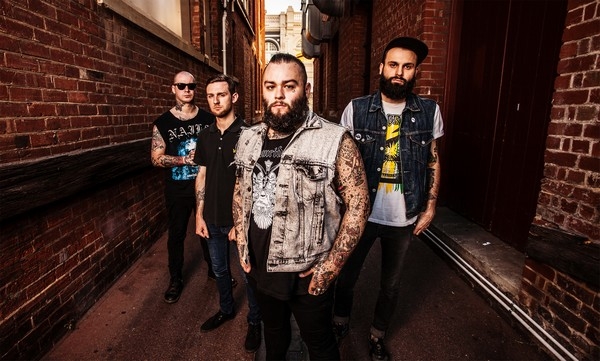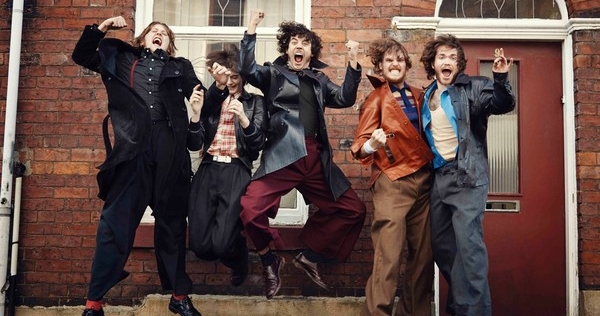“When you start a band, it’s all kind of fun, and you do the band because you enjoy it,” says guitarist Laurent ‘Lags’ Barnard. “Then you soon find yourself being on the road loads, and the band goes from a fun project to being work. Obviously being in a band’s not work, it’s fun, you get to tour the world and do all that kind of stuff. But sometimes it loses that creative spark that makes you want to do it. A lot of bands I know fall into traps of re-releasing the same record or not changing their sound because that’s what they think will keep them going. Whereas I feel like with Gallows, we’re the opposite.”
By virtue of upholding the band’s hobby-like nature, the band members didn’t burn themselves out touring behind 2012’s self-titled LP. To be sure, following the album’s release, they did head out on a global tour, but things slowed down in mid-2013. As a result, by the time 2014 rolled around, everyone was enthusiastic to make a new record.“The only reason we did another album is because we didn’t have any pressure to go on tour,” says Barnard. “We were like, ‘How fun would it be to write a new album and just try a few different ideas we’ve always wanted to do?’ And that’s how Desolation Sounds started. As a result, I feel like it’s the most free we’ve all felt making music together.
“It was a chance for us to try out different ideas, and it’s nice to know we’ve got an audience,” he adds. “Whether they’re going to accept what we’ve done, or these new directions we’ve taken our music in is a different question, but we know they’re going to listen, which is awesome.”
Despite their rejection of the commercial imperative, it’s a long time since Gallows could be described as an underground act. Such was the success of their 2006 debut Orchestra of Wolves, the band signed with Warner Bros. ahead of 2009’s Grey Britain. This move inevitably brought about additional pressure, but it wasn’t all coming from the label.
“When we signed to a major, I think a lot of people expected us to soften our sound and become a bit more mainstream,” says Barnard. “But we didn’t, we just went harder. When it came to Wade [MacNeil, vocals] joining the band, again we felt like we had to prove something so we wrote a record that’s really intense, really fast, really heavy [Gallows, 2012]. With this record, it’s almost like no one’s expecting anything from us. The first three albums have all been massive statements for the band. This fourth record is also a statement, but it’s a different kind of statement. It’s just us saying ‘We’re here, and we write our own rules.’”
So how does Gallows’ extra-autonomy manifest itself on Desolation Sounds? For the most part, the band stay true to their heavy, aggressive trademark, but there are some notable departures. The most obvious is Bonfire Season – an especially melodic, almost anthemic rock number, which also contains a rumbling darkness.
“When I initially wrote the music for that song I was influenced by a lot of post-punk; bands like Joy Division, Siouxsie and the Banshees, Killing Joke and The Cure,” Barnard says. “At the same time, getting Wade to sing on it, there’s a real swampy sound. I can imagine it being used on the True Detective soundtrack or something like that. It’s got a certain kind of Americana, which I really like.
“Bonfire Season has got a real attitude, and it’s a beautiful song and it’s a bit dark and mysterious at the same time. Those are qualities that I love in music. I can be listening to Tragedy, who are real hard crust punk, or I could listen to Lana Del Ray, but both those artists move me. I think we create that kind of feeling on Desolation Sounds.”
Straight after Bonfire Season is a gut-punching burst of New York hardcorecalled Leather Crown. This stark juxtaposition is a prime indication of the band’s no-scruples approach to Desolation Sounds. “It wasn’t a sense of ‘If we’re going to water down our music in one place, we’re going to have to make it even heavier somewhere else’”, says Barnard. “If was just a case of, ‘We really love this track, let’s make it this way.’ If you listen to the whole album, while there’re different styles and a lot of different ideas crammed into that 30 minutes, there’s a real sense of atmosphere throughout. There’s big soaring guitar sounds and it’s got a real mood to it. Whether we’re playing hard or soft, it’s haunting and weird and it’s exciting.
“From the start Gallows was a unique band,” he adds. “I don’t feel we’ve ever tried to fit in or align ourselves with a scene or a movement. We came on the scene and we’ve always done what we wanted. We haven’t tried to pander to anything mainstream.”







